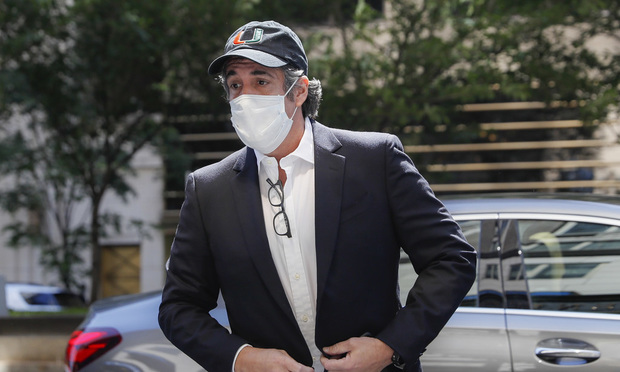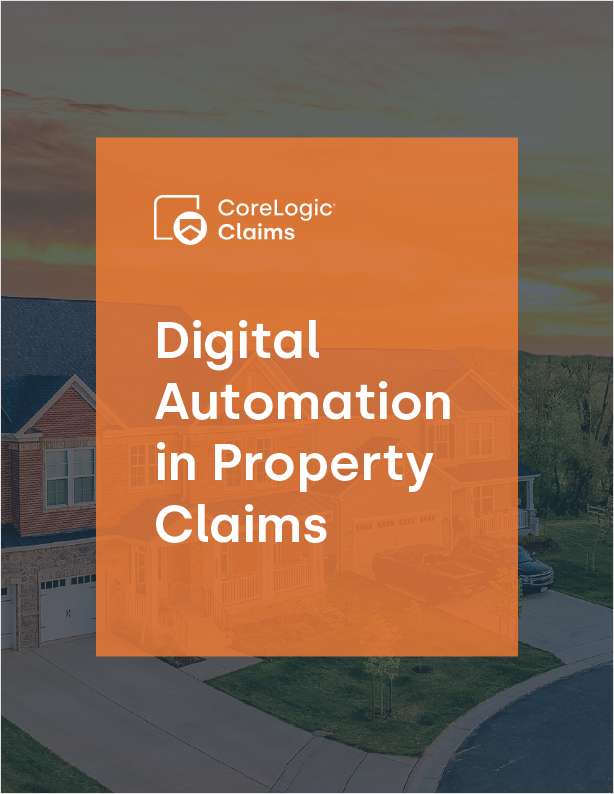Blatantly Unconstitutional Gag Order Rightly Repudiated
A person's constitutionally protected speech and religious rights are not forfeited upon criminal incarceration. We applaud Judge Hellerstein for calling it like it is.
July 28, 2020 at 04:03 PM
5 minute read
 Michael Cohen arrives at his Manhattan apartment in May after being furloughed. (AP Photo/John Minchillo)
Michael Cohen arrives at his Manhattan apartment in May after being furloughed. (AP Photo/John Minchillo)
It's well established that any system of prior restraints of expression bears a heavy presumption against its constitutional validity, and that the state carries a heavy burden of showing justification for the imposition of such a restraint. Statutes and court orders restraining publication of information are enforced only when necessitated by a compelling governmental interest, and even then they are narrowly tailored to serve that interest, if indeed any justification would suffice to sustain a permanent order.
When the information is lawfully obtained, its publication cannot be prohibited except when necessary to further that compelling interest. In an extraordinary case such a restriction might be justified, but the justifications must be adduced on a case-by-case basis, with all interested parties given the opportunity to participate, and less restrictive alternatives must be adopted if feasible.
So why then was it permissible for the government to condition Michael Cohen's furlough on the restraint on his speech? Cohen was serving a three-year sentence for charges including Trump campaign finance violations, when in May, due to a history of respiratory issues making him vulnerable to COVID-19, he was furloughed from prison early. He was attempting to convert the furlough to home confinement, but when he refused to sign a gag order that would prohibit him from "speaking to or through any media of any sort", including social media or publishing a book, as a condition of his prison release, Cohen was taken back into custody.
According to pleadings filed recently as part of a lawsuit against the Federal Bureau of Prisons (BOP) and Attorney General William P. Barr, Cohen argued that a gag order outlining the conditions for his continued release — barring him not only from writing the book but also muzzling him from even discussing it — was tantamount to a violation of his constitutional rights. Cohen said his book will contain "my firsthand experiences and observations based on my decade-long employment and relationship with Mr. Trump and his family, both before and after he was elected." Its working title is "Disloyal: The True Story of Michael Cohen, Former Personal Attorney to President Donald J. Trump." The memoir "describes the President's pointedly anti-Semitic remarks and virulently racist remarks against such Black leaders as President Barack Obama and Nelson Mandela, neither of whom he viewed as real leaders or as worthy of respect by virtue of their race." The order Cohen was asked to sign required "no engagement of any kind with the media, including print, TV, film, books, or any other form of media/news." It also prohibited "all social media platforms" and barred family or friends from posting on his behalf.
Cohen's lawsuit references recent efforts to block the publication of books by Trump's former national security adviser, John Bolton, and the president's niece, Mary L. Trump. In both cases, the authors were to publish. Of course, neither Bolton nor Trump were prisoners.
A person's constitutionally protected speech and religious rights are not forfeited upon criminal incarceration, although these rights are subject to significant curtailment in the prison setting. It is well established that lawful incarceration results in the withdrawal or limitation of many privileges and rights, necessary by the considerations underlying our penal system. When a prison regulation impinges on inmates' constitutional rights, the regulation must be reasonably related to legitimate penological interests; there must be a valid, rational connection between the prison regulation and the legitimate governmental interest to justify it; that connection must not be arbitrary or irrational. Three other factors are considered: the existence of alternative means available to inmates for exercising the right; the impact that an accommodation of the asserted constitutional right will have on other inmates and guards, and on the allocation of prison resources generally; and the absence of alternatives available to the prison for achieving the legitimate governmental objectives.
While courts will defer to the judgment and expertise of prison officials with respect to issues of prison security, there was no need for such deference here. Rather, as Judge Hellerstein, hearing the matter in an expedited fashion, stated: "I make the finding that the purpose of transferring Mr. Cohen from furlough and home confinement to jail is retaliatory, and it's retaliatory because of his desire to exercise his First Amendment rights to publish a book and to discuss anything about the book or anything else he wants on social media and with others." Hellerstein continued, "In 21 years of being a judge and sentencing people and looking at the terms and conditions of supervised release, I have never seen such a clause."
Neither has anyone on this Board, whose members collectively have handled thousands if not tens of thousands of cases. We applaud Judge Hellerstein for calling it like it is. Not only did he vindicate Cohen's constitutional rights, he also preserved the authority of the government's right to impose justifiable restrictions on prisoners necessary to achieve legitimate governmental purposes by applying well established law to the facts before him.
This content has been archived. It is available through our partners, LexisNexis® and Bloomberg Law.
To view this content, please continue to their sites.
Not a Lexis Subscriber?
Subscribe Now
Not a Bloomberg Law Subscriber?
Subscribe Now
NOT FOR REPRINT
© 2025 ALM Global, LLC, All Rights Reserved. Request academic re-use from www.copyright.com. All other uses, submit a request to [email protected]. For more information visit Asset & Logo Licensing.
You Might Like
View All
ADVANCE Act Offers Conn. Opportunity to Enhance Carbon-Free Energy and Improve Reliability With Advanced Nuclear Technologies

Trending Stories
- 1ACC CLO Survey Waves Warning Flags for Boards
- 2States Accuse Trump of Thwarting Court's Funding Restoration Order
- 3Microsoft Becomes Latest Tech Company to Face Claims of Stealing Marketing Commissions From Influencers
- 4Coral Gables Attorney Busted for Stalking Lawyer
- 5Trump's DOJ Delays Releasing Jan. 6 FBI Agents List Under Consent Order
Who Got The Work
J. Brugh Lower of Gibbons has entered an appearance for industrial equipment supplier Devco Corporation in a pending trademark infringement lawsuit. The suit, accusing the defendant of selling knock-off Graco products, was filed Dec. 18 in New Jersey District Court by Rivkin Radler on behalf of Graco Inc. and Graco Minnesota. The case, assigned to U.S. District Judge Zahid N. Quraishi, is 3:24-cv-11294, Graco Inc. et al v. Devco Corporation.
Who Got The Work
Rebecca Maller-Stein and Kent A. Yalowitz of Arnold & Porter Kaye Scholer have entered their appearances for Hanaco Venture Capital and its executives, Lior Prosor and David Frankel, in a pending securities lawsuit. The action, filed on Dec. 24 in New York Southern District Court by Zell, Aron & Co. on behalf of Goldeneye Advisors, accuses the defendants of negligently and fraudulently managing the plaintiff's $1 million investment. The case, assigned to U.S. District Judge Vernon S. Broderick, is 1:24-cv-09918, Goldeneye Advisors, LLC v. Hanaco Venture Capital, Ltd. et al.
Who Got The Work
Attorneys from A&O Shearman has stepped in as defense counsel for Toronto-Dominion Bank and other defendants in a pending securities class action. The suit, filed Dec. 11 in New York Southern District Court by Bleichmar Fonti & Auld, accuses the defendants of concealing the bank's 'pervasive' deficiencies in regards to its compliance with the Bank Secrecy Act and the quality of its anti-money laundering controls. The case, assigned to U.S. District Judge Arun Subramanian, is 1:24-cv-09445, Gonzalez v. The Toronto-Dominion Bank et al.
Who Got The Work
Crown Castle International, a Pennsylvania company providing shared communications infrastructure, has turned to Luke D. Wolf of Gordon Rees Scully Mansukhani to fend off a pending breach-of-contract lawsuit. The court action, filed Nov. 25 in Michigan Eastern District Court by Hooper Hathaway PC on behalf of The Town Residences LLC, accuses Crown Castle of failing to transfer approximately $30,000 in utility payments from T-Mobile in breach of a roof-top lease and assignment agreement. The case, assigned to U.S. District Judge Susan K. Declercq, is 2:24-cv-13131, The Town Residences LLC v. T-Mobile US, Inc. et al.
Who Got The Work
Wilfred P. Coronato and Daniel M. Schwartz of McCarter & English have stepped in as defense counsel to Electrolux Home Products Inc. in a pending product liability lawsuit. The court action, filed Nov. 26 in New York Eastern District Court by Poulos Lopiccolo PC and Nagel Rice LLP on behalf of David Stern, alleges that the defendant's refrigerators’ drawers and shelving repeatedly break and fall apart within months after purchase. The case, assigned to U.S. District Judge Joan M. Azrack, is 2:24-cv-08204, Stern v. Electrolux Home Products, Inc.
Featured Firms
Law Offices of Gary Martin Hays & Associates, P.C.
(470) 294-1674
Law Offices of Mark E. Salomone
(857) 444-6468
Smith & Hassler
(713) 739-1250












